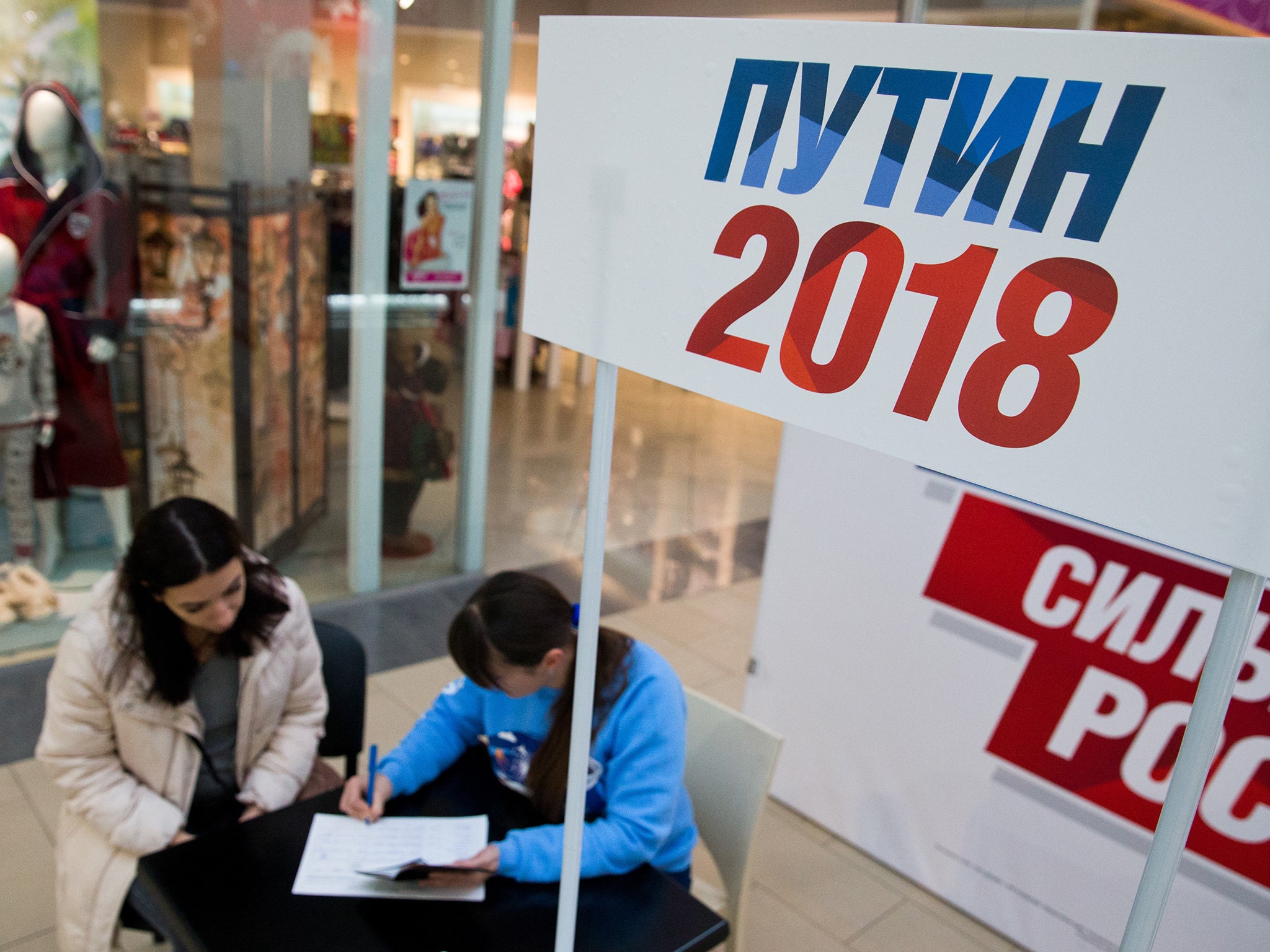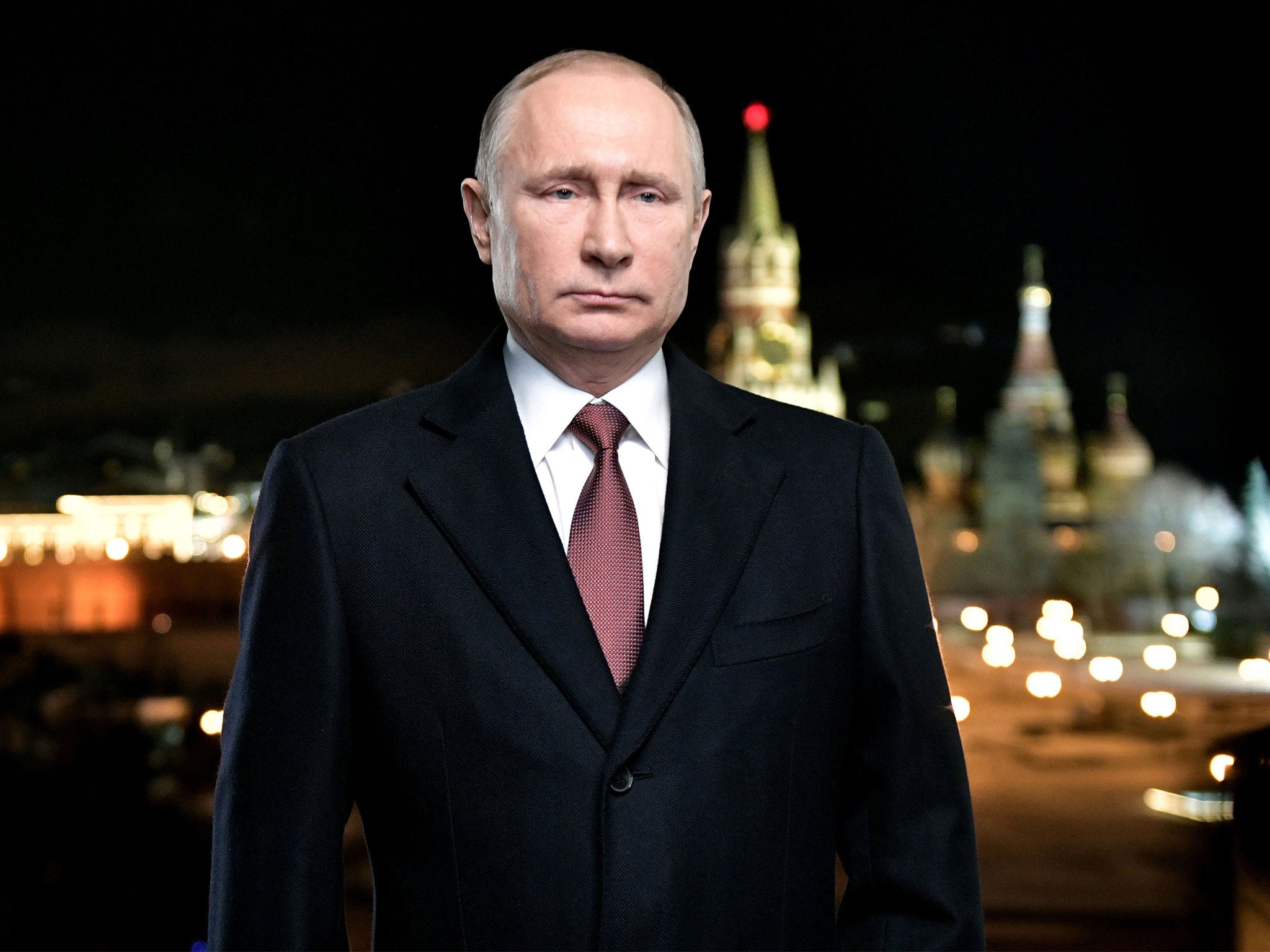Putin supporters launch nationwide signature drive to secure his 2018 Russian presidential bid
March vote is widely-expected to return the ex-KBG agent to the Kremlin

Efforts to secure Vladimir Putin’s place on the ballot in Russia’s 2018 presidential election have begun with supporters from his “Volunteers of Victory” movement seeking the 300,000 signatures he needs to qualify.
Mr Putin announced he was running for the Russian presidency at the beginning of December; a vote that is widely-expected to keep him in power for another six years.
Self-nominees in the Russian presidential race must gather at least 300,000 signatures of support from across the country.
The Moscow branch of Volunteers of Victory, a group ostensibly campaigning for veterans and the protection of Russia’s “history”, but which operates as the de facto backer of Mr Putin’s 2018 bid, said signature collection points had opened across the capital.
In Russia’s far east, collection points were opened in the city of Khabarovsk, where advocates of the 65-year-old incumbent President hoped to contribute to his tally.
Stations were also set up to gather signatures in the disputed region of Crimea, which Russia annexed from Ukraine in 2014 and now claims as its own.
Russia’s presidential elections are scheduled for 18 March. The head of the Central Elections Committee has reported that a record number of candidates – 64 – put their names forward.
The vast majority will not be able to provide the required number of signatures to be officially registered.
Since Mr Putin is running as an independent, he must gather 300,000 from all of Russia’s regions, but other candidates running from parties need to collect a third of that number.
The candidates sure to take partake are the veteran presidential hopefuls Grigory Yavlinsky, from the liberal Yabloko party, and Vladimir Zhirinovsky, from the misleadingly-named Liberal Democratic Party of Russia – he is, in fact, close to US President Donald Trump in many of his positions.
There has been drama already in the campaign. In late December, leading Kremlin critic Alexei Navalny was barred from running over an embezzlement conviction he says was politically motivated and has been ruled unlawful by the European Court of Human Rights.
Mr Navalny has called for a nationwide protest on 28 January in support of his call to boycott the March vote, saying he “will not recognise elections without competition”.
At the same time, fellow liberal politician and TV celebrity Ksenia Sobchak was given the go-ahead to collect signatures.
Perhaps the biggest drama of the campaign came with the news that Gennady Zyuganov, the long-serving leader of the Russian Communist Party, would not be running.
Mr Zyuganov, who came close to winning the 1996 election, sensationally withdrew at the last moment.
He will be replaced by the populist Pavel Grudinin, a collective farm director whose easy style, relative youth and direct talk are likely to endear him to the Russian population.
Unsurprisingly, he has already become the target of Kremlin attack dogs.
All the opinion polls point to a decisive first round victory for Mr Putin and low single-digit figures for the main liberal opposition.

A recent survey by the Russian Public Opinion Research Centre gave Mr Putin an 82 per cent approval rating.
In the 2012 presidential vote, he secured 63.6 per cent of the vote.
Many will be watching the performance of Mr Grudinin and whether he will be able to advance significantly on the 17.2 per cent recorded by his predecessor in 2012.
Victory for the former KGB agent in March would mean Mr Putin will have spent 24 years as Russia’s leader – either prime minister or president – by the end of his six-year term.
Earlier this week, Mr Putin said serving in the KGB between 1975 and 1991 had prepared him for the pressures of the presidency.
“Yes, I’m in the limelight, but in my previous life I always tried to act as if I was constantly being watched,” he said.
“It’s strange, but that’s how it worked out, perhaps because of my previous work.”
Serious campaigning for the upcoming election will begin at the end of January, when the deadline for submitting registration documents passes.
Under Russian law, televised debates and election campaign videos can only be broadcast 28 days prior to the election – and must end one day before – with campaigning prohibited on the eve of the vote.
In order for Mr Putin to win in the first round of voting, he must secure more than 50 per cent of the vote.
Join our commenting forum
Join thought-provoking conversations, follow other Independent readers and see their replies
Comments